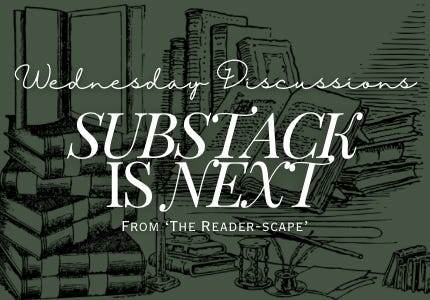Substack is Next…
The ways in which Substack is becoming the next toxic social media. A discussion post.
Welcome to Stories and States! I’m Bakhtawar and you’re reading Wednesday Discussions from The Reader-scape, a series of posts where we chat about things to reflect on how we can brainstorm solutions to reader problems.
On to the Post…
Remember when Threads from Instagram came out?
It raved about genuine humans, and a comfortable space. A Twitter without the drama.
Truth is, though, the introduction of social media has brought significant changes to our behaviour. We are reactionary beings now. We react and curate. Even though our intentions are to keep these emerging online spaces clear of drama, we can only do so if we take proactive action. Today, I hear Threads is worse than Twitter.
We are looking at a serious problem here, and as Substack gains traction, more publications, and more readers, I wonder if it’s next.
Yesterday, I saw a long reactionary Note essay about a negative comment the creator got. They blocked the negative commenter. But they also wrote that note. It’s not the first time such behaviour has taken place here. In fact, it highlights our need to react (even if with the lens of justice on).
What makes TikTok, Reddit, X, and other social medias a cesspool of conflict is not isolated traits that only ‘bad’ people have. It is our very need to speak up and react to ‘wrong’ instead of directly dealing with it, that makes such conflicts exist in the first place. We comment and reply to comments under content created to spark conflicts. What’s the solution?
This perceived ‘bad’ trait that makes social media bad, and might make Substack bad is this:
The block button isn’t sufficient for us anymore.
It exists for a reason, after all, and if you think about it, it gets rid of the content you considered bad, and the person who offended you. Yet, that’s not enough, is it?
Good thing for us, though. Instead of changing, today, we can rely on marketing to do its work and make the content fit us and ultimately, validate our reactions. Hooray? Enter influencers who spark controversy for the views, content that makes you react, which pushes things into becoming mainstream. Drama for the crowd.
At some point, we need to start asking ourselves if everyone even needs to know our reaction to something?
In my post Why Deep Thinking is Dying, I hint towards an entitlement from the audience catered by the structures in place that make success vital for the creator’s livelihood. This creator then looks to create what will garner a larger audience. Turning us into people who require this much validation was then a no brainer, even if this is an unintentional byproduct. Our lack of self-sufficiency is easier to prey upon to meet those goals.
Whether you’re a creator or consumer, the dynamic within the duo is likely to become manipulator and victim, fast, in a confusing paradox.
But fear not, now we have Substack. Long form content! Which means we’re not like other social media groups out there in this sanctuary of ours... right?
Except this reactionary reformation of the way we navigate life has definitely had an impact on the way we write long form. On how we teach writers long form. Write less, write more, be more snappy, more easy, more reachable, and so on. Manipulate better. Squash your craft to bits for the better.
Let’s discuss
1) Reflect on your own experience and try to identify how you may be falling into such behaviour.
2) What is your take?
3) How do we stop Substack from becoming like other platforms?
The Reader-scape is a series of posts where I reflect on what it means to be a reader in today’s world.
1. The Case of Reading in Today’s World
Welcome to Stories and States! I’m Bakhtawar, and I write about the literature I consume while trying to keep my morality intact as the world makes the reader-scape more difficult to navigate day aft…
If you liked this post, consider sharing the post to others who might like it!





Appreciating your thoughts. It makes me think of a book: Stolen Focus by Johann Hari. Social media and smartphones (among other things) are shifting how our brains work, how we interact (or don't), our motivation, our capacity for focus and deep thinking. It takes intention and effort for most of us to be aware and not fall into the reactionary, impulse-driven mode that the designers of these platforms are banking on. I see a trend in my clients of more and more awareness and discomfort with their use of social media and screens, while struggling to change their behaviors. I think more conversations about these topics are essential to create the digital and irl future that will nourish more than erode.
I'm new to Substack and hopeful that it will be a place to interact at deeper levels and to cultivate growth, connection, and curiosity.
I've seen this idea of coming to Substack to find a "better" social media, but I don't relate to that and feel passive in this conversation. The only time I use social media is when I want to be entertained or when I want to record my own life. I don't like keeping a physical journal, and I can access my social account anywhere with my phone and the internet. To be specific, I watch things on YouTube and post short things on Threads. I've grown up with YouTube, but I feel distant from the culture. Similarly, I don't really know what's going on with Threads, I just show up and do my own thing, very occasionally scrolling through to find questions and thoughts that I want to respond to for fun (if I don't get tired out by the yelling first).
I've been aware of the complaint of reactionary content that people hold towards social media, but in response, I think I turned to avoidance and don't use social media as social platforms. It feels more like a solitary experience (which I am satisfied with). If anything, I'll send interesting videos to my friends via text and talk with them. That's as social as these platforms get for me.
That all said, I feel more compelled to comment and share my thoughts the older I've become (barely a few years older, haha), especially on Substack. It's the thoughtfulness and a display of willingness to establish community found in most users that encourages me. I think that this phenomenon is, in part, a phenomenon that needed the hellish evolution of other social platforms in order to exist: if not for these bad experiences, the bitter observation of these sites, we wouldn't feel compelled to be open and welcoming, and we wouldn't be wary of its traps/downfalls. We know the risks, we've seen the bad, so we want to encourage the good of it. I look forward to seeing similar conversations like this on this site because the whole Notes aspect still feels way too similar to Threads for me.
As to how to move forward... I don't know. I just want to engage as naturally as I can without the fear of being loudly misconstrued. I still feel stressed when posting comments and even just liking posts.